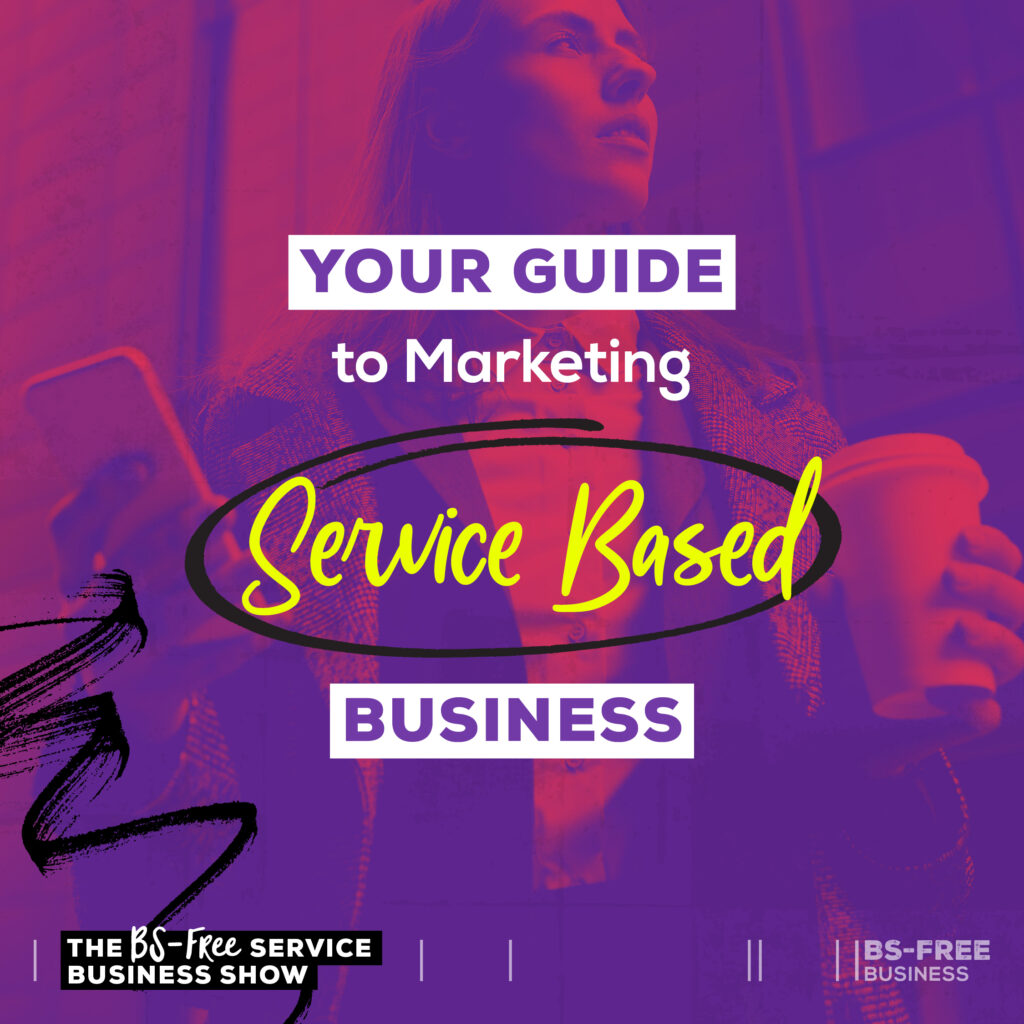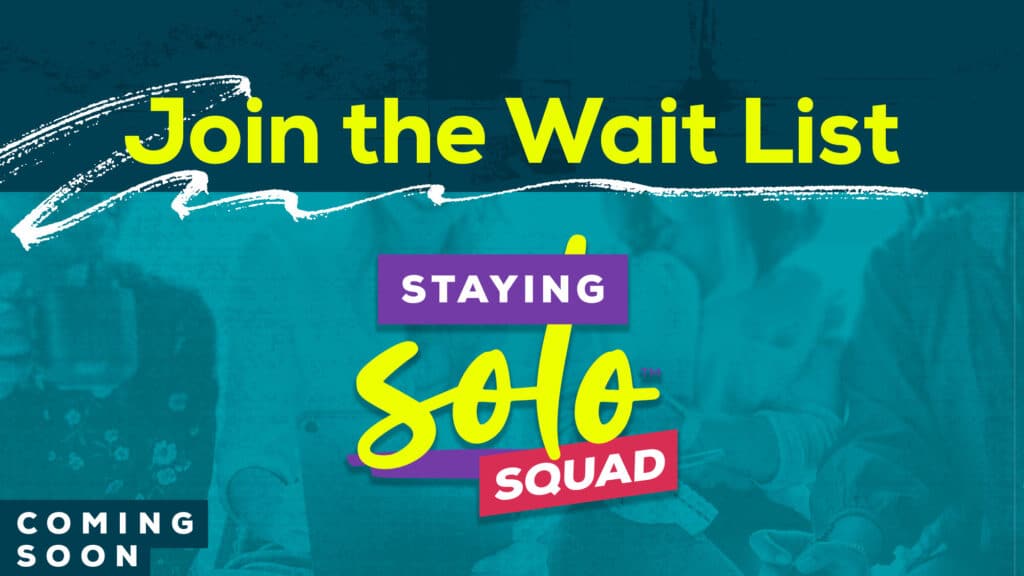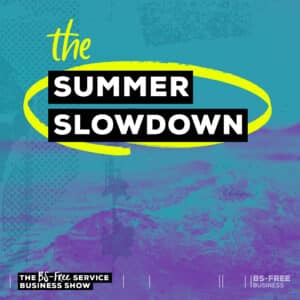
Search the site:
Your Guide to Marketing a Service Based Business
I encounter two types of service business owners when I talk about marketing. First, there’s the marketers. They’re always happy to be testing things out in their own business. Then, there are the rest of the service business owners who would rather do anything but marketing. In this episode, I’m sharing my guide to marketing a service-based business, no matter how you feel about it.
As a marketing and communications person, you’d think I’d talk way more about what you should know about marketing a service based business. But to be honest, it’s not a topic that I’m excited about unless we start talking about what marketing you shouldn’t be wasting your time on.
Marketing encompasses a wide range of strategies and tactics, and it can be overwhelming to figure out what will work best for your business. And what ends up happening is we can end up investing a lot of time, energy, and even money into marketing that doesn’t work for our business.
While I’m always up for a marketing experiment, I detest seeing service business owners wasting their time on tactics that aren’t ever going to work for their business.
A common piece of advice in the online business world is to “be everywhere” so that your prospective client can find you. The only problem is the majority of service-based providers don’t need that many new clients on an ongoing basis to have a full client roster, and there’s no need for them to cast such a wide net.
Especially when many of the most common tactics taught by celebrity entrepreneurs aren’t even designed for service business owners who offer one-to-one services. Those tactics are best used for those who need to build a big audience in order to sell their one-to-many offers.
So, let’s take a look at what you actually need to know about marketing a service-based business.
Are You Selling B2B or B2E?
For the past four years, I’ve been urging people to realize that marketing tactics taught in the online business world are designed for those selling to other entrepreneurs.
There’s a huge difference between the tactics you need to sell to a corporate or true B2B client and an entrepreneur. This is why I coined the term B2E, which is business to entrepreneur, so we have a clear distinction between these two audiences. I’ve spent far too much time as a consultant advising service business owners that they’re using marketing tactics that are not right for their business.
Your marketing strategy and tactics must be informed by who the end client is and how they will most likely discover you. There’s a massive difference between marketing and selling website copy to a solo online business owner and a VP of marketing in a Fortune 500 company.
Honestly, I don’t blame service-based business owners for this, but rather people teaching marketing who have ZERO business teaching marketing, particularly to people who focus on real B2B clients. B2E tactics don’t work the same way in B2B, and they’re very likely to result in you never getting your foot in the door.
Being crystal clear on who you’re actually selling to is the first step to having a marketing plan that actually gets results. Now, let’s walk through my recommended marketing tactics for service-based business owners.
Your Marketing Must-Haves
Let’s start with the must-haves for your marketing. Before we get into the actual tactics, I want to remind you of something I said a few minutes ago.
As a service-based business owner, you have very limited spots for new clients on an ongoing basis, so your marketing can be simple. I remind you of this as many times I’ll talk to people about these tactics for marketing a service-based business, and they’ll want to add 77 other things as they believe more marketing is better marketing.
That’s patently untrue. The goal is to focus on the tactics that will have the greatest impact in the least amount of time, which is where the must-haves come in. These tactics should be considered the bare minimum baseline for every type of service-based business owner regardless of their target market.
SEO-Focused Website
You’ve all heard how I started my business and didn’t have a website for the first eight years. I could get away with that in 2005, but that’s a downright terrible idea here in 2023.
You need a solid web presence so you’re findable online, and to maximize your online home, you need to have an SEO-focused website. You need to ensure that your target clients can find you when they’re looking for answers to questions you can solve or to hire someone who offers what you do.
SEO can seem daunting, but it’s a small investment to make to ensure that your website actually helps you generate leads.
Referral Plan
Most service business owners build their client roster via referrals. However, it’s common for people to be passive about getting those referrals.
Every service business owner needs a plan for their referrals and to make a habit of asking for them. Being proactive and making it easy for people to refer you is a simple way to reach more potential clients.
The Keep in Touch Strategy
Listen, what I’m going to say next will probably not excite you, but trust me when I say this matters. It’s better for you to invest your time into your existing network and keep in touch with them versus having to find new, cold people constantly.
Your professional network is worth its weight in gold, so you need to treat it like the precious asset it is. The keep-in-touch strategy is really about having a game plan for keeping up with people in your network. This may be messages, lunch or coffee dates, or catch-ups on Zoom.
It takes commitment, but people who know, like and trust you already are your best advocates and keeping in touch in a genuine way is always going to pay off with referrals, recommendations and other opportunities.
Your Nice to Haves
Let’s say you have all the “must-haves” under control, and you want to expand your efforts for marketing a service-based business even further. While the must-haves require minimal effort, with the “nice to haves,” you’ll be stepping up your marketing a notch.
Events
For those of you who like to leave your house and put on pants, events can offer a way to meet new people and expand your circle. For events, look for events where your potential clients will be and with the goal of being someone who can stand out.
For example, if I’m going to invest in an event in order to meet new potential clients, I’d rather attend an event where I’ll be one of the only marketing/communications people in the room. In my case, I’d likely go to an event targeting tech executives, but that wouldn’t have a lot of marketing people versus going to a content marketing-type event full of people like me.
Taking the time to target events carefully can help maximize the time and money often required to attend in-person events. Alternatively, consider online events and how you can leverage those. Is there a professional association in your industry you can do virtual training with or collaborate with in some way?
I know many of you aren’t into social media as often, but LinkedIn is a different and very viable platform for marketing your business. (Best of all, you don’t have to learn to dance or otherwise entertain Gen Z.)
With LinkedIn, you can start by simply engaging on the platform. Connect with people in your market, comment on posts, and engage with people you’re already connected to.
From there, you can start posting your own content on the platform as a way to reach more people and build your thought leadership. Even one or two solid posts a week can go a long way, and my clients are often surprised by the leads they get from LinkedIn.
Other People’s Platforms
Depending on your skill set and target client, being a special guest star on Other People’s Platforms is an amazing way to reach an existing yet aligned audience.
This may be guesting on a podcast, speaking at an event, guest teaching in a program, or even guest posting. There are many possibilities, but to effectively execute this strategy, you’ll need to do some research and craft your pitch.
Remember that this is a longer-term strategy that builds over time and not something that will drive immediate results.
Maybe Marketing
Next up is the last category I’m calling maybe or ‘it depends” marketing…as I may or may not recommend this to you if you were my client.
What I will say next, as a content marketer and a podcaster/blogger for too many years to count at this point, maybe surprising. Many service-based business owners don’t need to do content marketing.
The big qualifying question for me is whether or not they should focus on blogging or podcasting, along with social media and email marketing, which always comes down to who the end client is.
If you work with B2B clients, unless you’re well-known in your industry or in a very specific niche, this is likely to be a giant waste of time.
Why? Building these platforms is hard; it takes years and energy to do well. That’s not to discourage anyone, but rather to keep in real around the fact that these tactics are the ultimate in long-lead time marketing.
I’m forever hearing from people who decide to work with us that they’ve been listening to the podcast for years. Think about that. They’ve been following me for years, and I don’t even know who they are! That’s a far cry from the existing relationships I was talking about with the keep-in-touch strategy.
If your audience is other entrepreneurs, focus on your content marketing and the strategies and tactics I discussed above.
Hero Content
Your hero content, such as a blog or podcast, is the main vehicle you’ll create that will drive your other content. Case in point: my podcast/blog is turned into email and social media content, both on the week it’s released and other times during the year.
As a blogger of 15 years and a podcaster of nearly 10, I focus on this type of content as I genuinely enjoy it, and I’m a writer by trade. In considering your hero content, my advice is always the same, which is to play to your skills and be ready to invest in honing your craft.
Email Marketing
Regarding content marketing, email is still a powerful way to engage and connect with your audience. That said, people’s inboxes are crowded, so you must be committed to creating content they want to read and consider how you will continue delivering ongoing value.
If you want to try marketing a service-based business but you’re new to email marketing, start small. A weekly newsletter is a great way to build a habit and expand over time. It’s easy to get sucked into creating all kinds of lead magnets and funnels, but until you have a baseline audience, focus on the basics. (Trust me on this one; fancy funnels and things are busywork you don’t need in your life until absolutely necessary.)
Social Media
Finally, there’s the beast of social media, aside from LinkedIn. As I said about email, I recommend you keep this simple and find your sweet spot platform, a platform your potential clients use and enjoy using.
And don’t try to be on all the platforms. Focus on one and do that one really well, as social media can be incredibly time-consuming, and you’re a service-based business owner, not a full-time creator.
Marketing a Service-Based Business: What Will You Choose?
With a service-based business, you have numerous choices regarding your marketing. Start by figuring out what’s already working for you, and then build from there.
Who your target client is should drive the type of marketing for service-based business decisions you make, not just what’s trendy or seems like it could be fun. Marketing that doesn’t support your business goals is simply a waste of your time and adds needless complication.


I’m Maggie Patterson (she/her), and services businesses are my business.
I have 20+ years of experience with client services, am a consultant for agency owners, creatives, and consultants, and vocal advocate for humane business practices rooted in empathy, respect, and trust.
Read or Listen to the Latest
For Solo Business Owners

Growing a solo service business is tough.
It’s even harder when you’re bombarded with BS advice that steers you away from your values and why you started your business in the first place.
This is the podcast for solo creatives and consultants who want to remain as a team of one and have zero interest in the hustle and grind of typical business teachings.
Subscribe now and never miss an episode.
For Micro Agency Owners
Most podcasts for agency owners obsess over revenue growth as the ultimate success metric.

But here’s the truth: not everyone wants to make millions. Your goal might be to build a sustainable business that lets you have a life and doesn’t run you into the ground.
Join me as I spill my shameless confessions and share everything I’ve learned about building a micro agency that skips the BS of tired and typical agency teachings.
Follow Now on All Major Podcast Platforms








